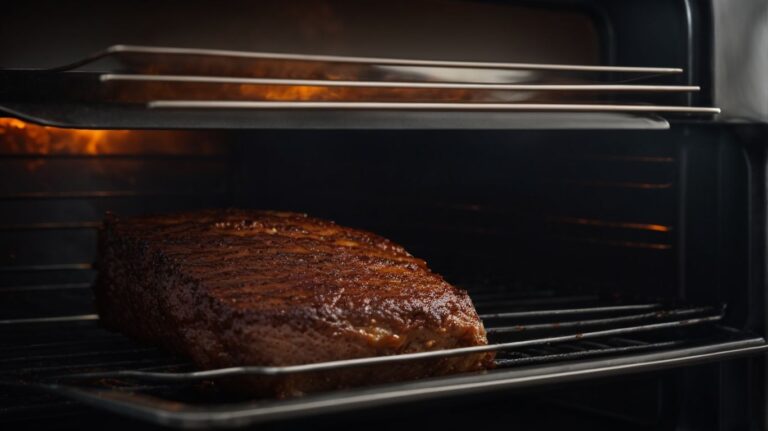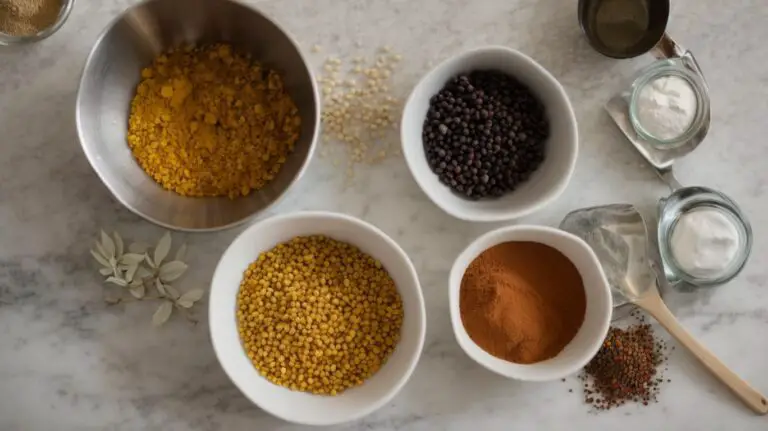How to Cook Meat After Marinating?
Are you looking to elevate your meat dishes to the next level? Marinating meat is a crucial step that can make a world of difference in the flavor, tenderness, and juiciness of your dishes.
We will explore the importance of marinating meat, how to properly marinate meat, tips for cooking marinated meat, common mistakes to avoid, and ultimately, how to enjoy your delicious marinated creations.
Let’s get cooking!
Key Takeaways:
The Importance of Marinating Meat
Marinating meat plays a crucial role in enhancing its taste, tenderness, and juiciness, making it a fundamental step in cooking delicious meals.
When meat is marinated, it allows the flavors from the marinade to penetrate the surface, resulting in a deeper taste profile. The acidic components in a marinade help to break down tough muscle fibers in the meat, thereby tenderizing it. This process not only improves the texture but also ensures that the meat remains moist during cooking. By marinating, you can transform a simple piece of meat into a succulent and flavorful dish that is sure to impress your guests.
Tenderizes Meat
Marinating meat helps to tenderize it by breaking down tough muscle fibers through the action of acids and enzymes present in the marinade.
This process involves the acids and enzymes penetrating the surface of the meat, where they work their magic.
Acids in the marinade, such as vinegar or citrus juices, help by denaturing the proteins in the muscle fibers, making them more tender. On the other hand,
enzymes, like papain found in papayas or bromelain in pineapples, target specific protein structures, further softening the meat. This dual action of acids and enzymes creates a more flavorful and succulent end product, making marinating an essential step for achieving tender and juicy meat.
Adds Flavor
Marinating meat not only tenderizes but also imparts delicious flavors as the marinade seeps into the meat, creating a flavorful infusion.
When meat is marinated, the flavors from the marinade penetrate the surface of the meat, breaking down the muscle fibers and adding depth to its taste profile. This process not only enhances the overall taste but also helps in tenderizing tougher cuts of meat, making them more succulent and enjoyable to eat. The choice of marinade ingredients, such as herbs, spices, acids, and oils, plays a significant role in determining the final flavor outcome of the dish.
Helps Keep Meat Moist
Marinating meat helps retain moisture during cooking by creating a protective barrier on the surface, preventing it from drying out.
This process allows the flavors from the marinade to penetrate the meat, enhancing its taste and tenderness. As the meat sits in the marinade, the acidic components like vinegar or citrus juice break down proteins, making it more tender. Basting the meat while cooking not only adds an extra layer of flavor but also helps to keep the surface moist by locking in the natural juices. The combination of marinating and basting results in a succulent and flavorful dish that is sure to impress your taste buds.
How to Properly Marinate Meat
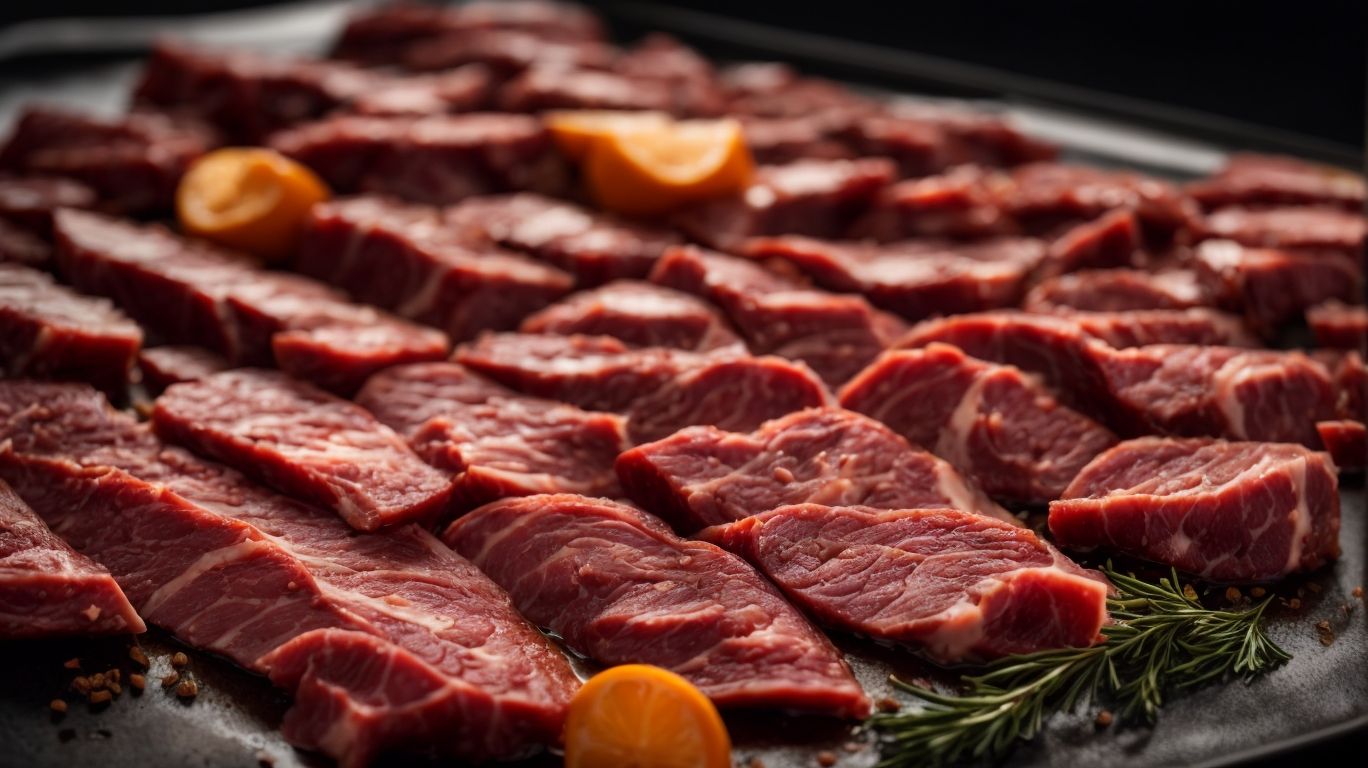
Credits: Poormet.Com – Anthony Perez
To marinate meat effectively, it is essential to choose the right marinade, prepare the meat correctly, marinate for the appropriate duration, and store it safely.
When selecting a marinade, choose one that complements the type of meat you are marinating. For example, citrus-based marinades work well with chicken, while soy-based marinades are great for beef.
Experimenting with flavors can add an exciting twist to your dish. Moving on to meat preparation, ensure the meat is clean and trimmed of excess fat to allow the marinade to penetrate evenly.
The recommended marinating times vary depending on the type of meat, with tougher cuts requiring longer marinating periods for optimal flavor. As a rule of thumb, refrigerate meat while marinating to prevent bacterial growth and maintain food safety.
Choose the Right Marinade
Selecting the right marinade is crucial as it determines the flavors, ingredients, and acids that will enhance the taste and texture of the meat.
Flavors play a significant role in shaping the final dish. The marinade’s flavors infuse into the meat, creating a well-rounded taste profile. Different ingredients in a marinade can bring out unique flavors; for example, herbs can add freshness, spices can provide heat, and citrus can bring a zesty brightness. Acids in a marinade tenderize the meat by breaking down its fibers, resulting in a more juicy and tender texture. Consider the balance of flavors, ingredients, and acids to create a harmonious marinade that complements the meat perfectly.
Prepare the Meat
Before marinating, prepare the meat by tenderizing tougher cuts, scoring the surface for enhanced flavor absorption, and ensuring it is clean and trimmed.
In terms of tenderizing the meat, there are various methods you can employ, such as using a meat mallet, marinating in acidic liquids like vinegar or buttermilk, or using a meat tenderizer tool. Tenderizing helps break down the muscle fibers, resulting in a more tender and juicy end product.
Scoring the surface of the meat not only allows the flavors of the marinade to penetrate deeper but also helps the meat cook more evenly. Opting for clean and trimmed cuts of meat ensures a higher quality outcome with a more consistent texture and taste.
Marinate for the Right Amount of Time
Allow the meat to marinate for the specified duration to ensure adequate absorption of flavors and tenderization, avoiding over-marinating that can affect the texture.
Marinating meat is a critical step in elevating its taste profile. The marinade acts as a bridge between the flavors you desire and the meat’s natural essence. It’s essential to follow a precise timetable to strike the right balance between enhanced taste and texture preservation.
When meats marinate for too long, enzymes in the marinade can break down the meat fibers excessively, leading to a mushy consistency. Conversely, insufficient time diminishes the flavor impact. Find that sweet spot for marination, and your culinary creations will reach new heights of deliciousness.
Store the Marinated Meat Properly
After marinating, store the meat in a refrigerator to prevent bacterial growth, ensuring it is kept at a safe temperature until ready for cooking.
When storing marinated meat in the refrigerator, always utilize air-tight containers or sealed plastic bags to maintain freshness and prevent cross-contamination with other foods. It’s crucial to place the marinated meat on the bottom shelf or a designated meat drawer to prevent any potential drips or leaks onto other items. Regularly check the refrigerator temperature to ensure it stays consistently below 40°F (4°C). Remember, never leave marinated meat at room temperature for an extended period as it increases the risk of harmful bacterial growth!
Tips for Cooking Marinated Meat
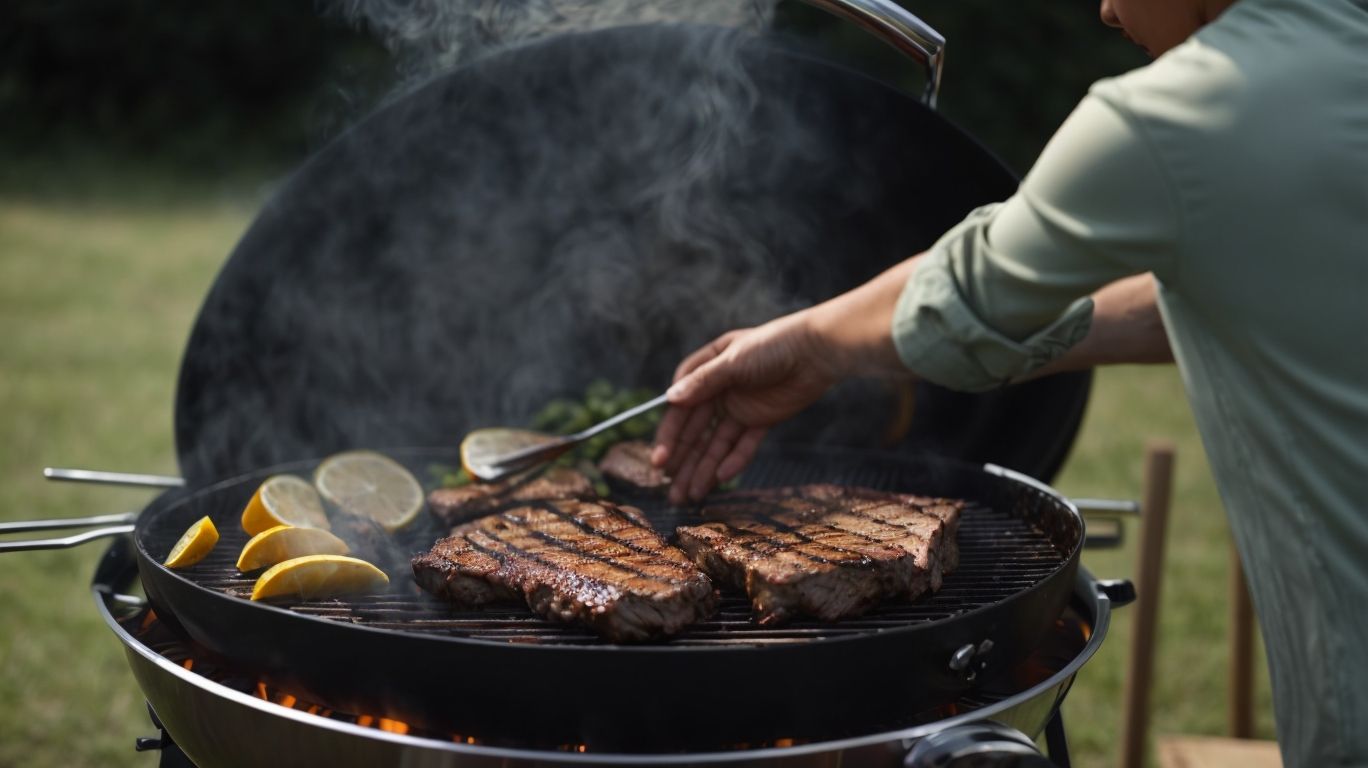
Credits: Poormet.Com – Gerald Wilson
When cooking marinated meat, remember to bring it to room temperature, preheat the grill or pan, drain excess marinade, cook to the right temperature, and allow it to rest before serving.
Bringing the marinated meat to room temperature helps it cook more evenly, preventing it from being tough or chewy.
Preheating your grill or pan ensures that the meat gets that nice sear and caramelization, enhancing the flavor.
After marination, make sure to drain off excess marinade to avoid flare-ups on the grill or a soggy texture on the meat.
Cooking the meat to the correct internal temperature is crucial for food safety and optimal taste.
Allowing the meat to rest after cooking lets the juices redistribute, resulting in a juicier and more flavorful dish.
Bring Meat to Room Temperature
Allow marinated meat to come to room temperature before cooking to ensure even cooking and optimal flavor development throughout the dish.
Bringing meat to room temperature helps to avoid the common pitfall of unevenly cooked dishes, where the exterior gets cooked faster than the interior, resulting in dry and tough meat.
By allowing the meat to sit at room temperature for about 30 minutes, it becomes more receptive to heat during cooking, ensuring that it cooks more evenly from the inside out.
This technique not only enhances the texture of the meat but also allows the flavors of the marinade to penetrate more effectively, creating a harmonious taste profile in every bite.
Preheat the Grill or Pan
Before cooking marinated meat, preheat the grill or pan to the required temperature to ensure proper searing and cooking of the meat.
Proper preheating is crucial when it comes to achieving that perfect sear on your meat. If using a grill, allow it to heat up for at least 10-15 minutes, ensuring it reaches a high temperature to create those beautiful grill marks and lock in the flavors.
If you are using a pan on the stovetop, heat it over medium-high heat until it is hot but not smoking. Temperature control is key here; too low a heat will result in steaming rather than searing, while too high can burn the marinade and impart a bitter taste to the meat.
Drain and Pat Dry the Meat
Before cooking, drain excess marinade from the meat and pat it dry to promote better searing and prevent excessive moisture during cooking.
Drawing out the excess marinade not only helps in achieving that perfect sear on the outside of the meat but also prevents steaming, ensuring a flavorful and evenly cooked dish. By removing the excess liquid, you allow the surface of the meat to caramelize effectively, enhancing its taste and texture.
Cook the Meat to the Right Temperature
Cook marinated meat to the appropriate temperature using a thermometer to ensure that it is safe to eat and retains its desired level of doneness.
When cooking marinated meat, it’s crucial to follow specific temperature guidelines to guarantee both safety and flavor. Inserting a thermometer into the thickest part of the meat helps in monitoring the internal temperature accurately. For beef, lamb, and veal, the recommended safe internal temperature is 145°F (63°C). Poultry should reach an internal temperature of 165°F (74°C) for safe consumption. Pork is considered safe at 145°F (63°C). This precision in cooking ensures that harmful bacteria are eliminated while preserving the juiciness and tenderness of the meat.
Let the Meat Rest Before Serving
Allow the cooked marinated meat to rest before serving to allow the juices to redistribute, enhancing flavors and ensuring a tender, juicy final dish.
When the meat is taken off the heat, the hot juices move towards the surface. Allowing the meat to relax after cooking enables these juices to evenly disperse back through the meat. This redistribution process keeps the meat moist and succulent, preventing it from becoming dry and tough. The resting period also gives time for the flavors to meld together, creating a more cohesive and delicious taste profile.
Common Mistakes When Cooking Marinated Meat
Avoid common mistakes when cooking marinated meat, such as over-marinating, neglecting proper rest periods, and other errors that can impact the final dish’s taste and texture.
One of the most prevalent pitfalls when handling marinated meat is over-marinating, which can result in a mushy texture and overpowering flavor. It’s essential to follow the recommended marinating times to prevent this issue.
Another mistake to steer clear of is inadequate resting time after cooking. Allowing the meat to rest before cutting or serving helps redistribute the juices, ensuring juiciness and tenderness. Skipping this step may lead to dry and tough meat, so remember to factor in enough resting time.
Improper cooking temperatures can also affect the outcome of marinated meat dishes. Make sure to cook the meat thoroughly and at the right temperature to achieve optimal flavor and texture. By steering clear of these common missteps, you can elevate the quality of your marinated meat dishes and delight your taste buds with perfectly cooked creations.
Using Too Much Marinade
One common mistake is using too much marinade, which can overpower the natural flavors of the meat, leading to an unbalanced taste profile.
Excessive use of marinade not only alters the intended balance of flavors but also affects the texture of the meat. When drenched in an excessive amount of marinade, the meat’s surface can become mushy and lose its desired tenderness.
Overpowering the meat with marinade can also hinder the Maillard reaction, the chemical process responsible for creating the appealing brown crust and enhancing the meat’s umami taste.
Not Adjusting Cooking Time
Another mistake is not adjusting the cooking time based on the marinated meat’s thickness, leading to instances of undercooked or overcooked dishes.
It is crucial to understand that the thickness of the meat can significantly impact the cooking process. A thicker cut of meat will require a longer cooking time to ensure thorough cooking, while a thinner slice will cook much faster. By taking this into consideration, you can effectively prevent the frustration of serving undercooked or overcooked meals.
For instance, a quarter-inch thick chicken breast will cook much quicker than a one-inch thick piece. If you fail to adjust the cooking time accordingly, you risk serving rubbery, overdone meat or, even worse, undercooked poultry containing harmful bacteria.
Not Letting the Meat Rest
Failing to let the meat rest after cooking can result in the loss of juices, leading to a less tender and flavorful final dish.
When the meat is cooked, the heat causes the juices inside to move towards the surface. If you cut into the meat immediately after cooking, these flavorful juices will spill out onto your cutting board, leaving your dish dry and lacking in taste. Allowing the meat to rest for a few minutes before slicing allows the juices to redistribute, resulting in a more succulent and delicious meal. This simple step can make a world of difference in the overall experience of enjoying your food.
Conclusion: Enjoy Your Delicious Marinated Meat!
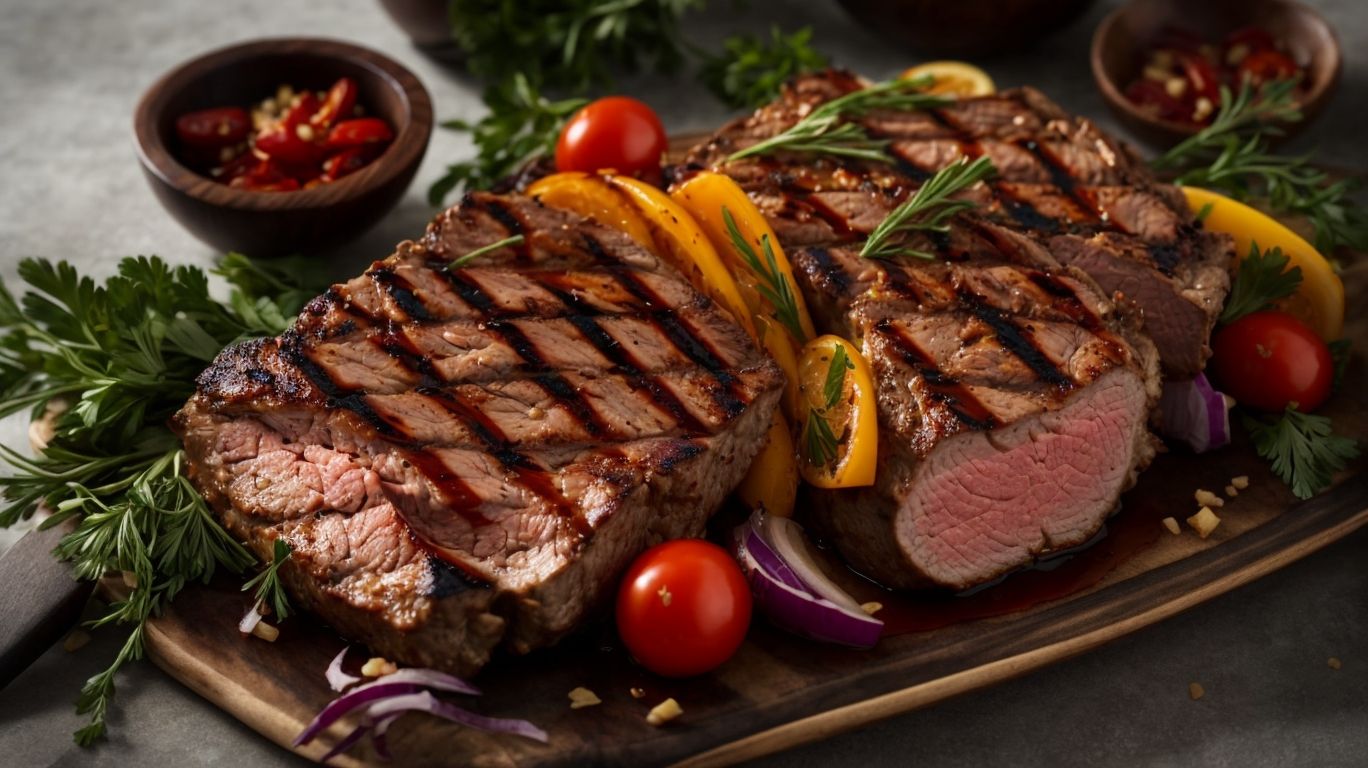
Credits: Poormet.Com – Nathan Garcia
Savor the delightful experience of cooking and relishing perfectly marinated meat that encapsulates flavors, tenderness, and culinary satisfaction.
Whether you’re grilling, roasting, or braising, the process of marinating elevates the dish to new heights, infusing each bite with a burst of delicious sensations.
The art of marinating meat involves a harmonious blend of seasonings, herbs, and spices that work together to enhance its natural flavors. From garlic and ginger to citrus zest and soy sauce, the possibilities are endless, allowing you to create a symphony of tastes that tantalize the palate.
Frequently Asked Questions
What is the best way to cook meat after marinating?
The best way to cook meat after marinating is to first remove the excess marinade, then grill, broil, or bake the meat to your desired level of doneness.
Can you reuse the marinade after cooking the meat?
It is not recommended to reuse the marinade after cooking the meat, as it may contain harmful bacteria from the raw meat. It is best to discard any leftover marinade.
How long should you cook marinated meat?
The cooking time for marinated meat will vary depending on the type and cut of meat, as well as the cooking method. It is best to consult a recipe or use a meat thermometer to determine when the meat is cooked to your liking.
Can you marinate meat for too long?
Yes, marinating meat for too long can actually have a negative effect on the texture and taste of the meat. It is recommended to marinate for 2-24 hours for the best results.
What are some tips for cooking marinated meat?
Some tips for cooking marinated meat include making sure the grill or pan is hot before adding the meat, using a meat thermometer to ensure proper doneness, and allowing the meat to rest for a few minutes before slicing or serving.
Is it necessary to marinate meat before cooking?
While marinating can add flavor and tenderness to meat, it is not always necessary. Some cuts of meat, such as tenderloin or ribeye, do not need to be marinated. It is a personal preference and depends on the recipe.



